| Srl | Item |
| 1 |
ID:
108742
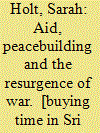

|
|
|
|
|
| Publication |
Hampshire, Palgrave Macmillan, 2011.
|
| Description |
xviii, 222p.
|
| Standard Number |
9780230240278
|
|
|
|
|
|
|
|
|
|
|
|
Copies: C:1/I:0,R:0,Q:0
Circulation
| Accession# | Call# | Current Location | Status | Policy | Location |
| 056386 | 954.9303/HOL 056386 | Main | On Shelf | General | |
|
|
|
|
| 2 |
ID:
183460
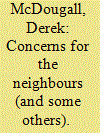

|
|
|
|
|
| Summary/Abstract |
Focusing on the conflicts in the Southern Philippines and West Papua, this article uses a framework developed from the literature on the internationalisation of ethnic conflict to suggest insights into international involvement in both conflicts. In both cases there are succinct overviews of the relevant general background to the conflict, and international involvement in particular, followed by a characterisation in terms of typological features that covers motives for involvement, objectives, means of involvement, and impact. Insights into international involvement in the two conflicts can suggest ways in which aspects of the general literature might be developed further, but two cases are insufficient to develop more broad ranging generalisations. A key insight is the way in which specifically political factors can affect the way in which motives for involvement manifest themselves, the significance of Sabah politics in relation to Malaysian involvement in the Southern Philippines, and West Papuan lobbying in the Melanesian countries being cases in point.
|
|
|
|
|
|
|
|
|
|
|
|
|
|
|
|
| 3 |
ID:
134107
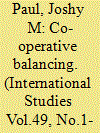

|
|
|
|
|
| Publication |
2014.
|
| Summary/Abstract |
The Asia-Pacific region is facing the threat of a number of potential military conflicts. Unresolved security challenges include the Sino-Japanese and Sino-Indian territorial disputes. The current peace and stability in the region has been achieved through various multilateral mechanisms and constant US involvement in the regional affairs. However, the declining US presence in Asia, the ineffectiveness of different multilateral institutions to establish a security order in the region and China's possible emergence as a great power in Asia may lead to the end of the status quo. In this context, it is pertinent that Asia should be free from both hegemony and power rivalry, and for that, 'co-operative balancing' is the best possible mechanism to achieve a long-term peace and stability. Co-operative balancing is a combination of power balancing and a co-operative security framework. It promotes the independent position of individual countries and strengthens the multilateral mechanisms. This essay concludes that India and Japan can balance against China while bilateral engagement among the three countries tends to reduce their distrust vis-à-vis China.
|
|
|
|
|
|
|
|
|
|
|
|
|
|
|
|
| 4 |
ID:
133135
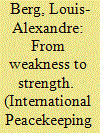

|
|
|
|
|
| Publication |
2014.
|
| Summary/Abstract |
The mixed results of efforts to reform the governance of security forces in the aftermath of conflict require deeper examination of the political constraints that shape statebuilding processes. In Bosnia and Herzegovina, attempts to restructure and centralize the security forces led to a substantial though incomplete reform of the military, but limited impact on the police forces. These uneven results are rooted in the nature of political coalitions that constrain recipient leaders and shape their interaction with external actors. While Bosnian leaders mostly relied on a cohesive political base that favoured close links between political parties and the police forces, fragmentation within these parties generated internal threats that enabled reforms to the military. This case demonstrates the limits of external influence without changes to underlying political conditions.
|
|
|
|
|
|
|
|
|
|
|
|
|
|
|
|
| 5 |
ID:
133134
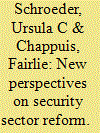

|
|
|
|
|
| Publication |
2014.
|
| Summary/Abstract |
This special issue identifies new directions in research on the consequences of international involvement in security sector reform (SSR). Both empirically and theoretically, the focus lies on the so far neglected role of local agency and domestic power constellations. The introductory article maps out different ways to analyse the external-domestic interaction dynamics that structure the often contentious and asymmetric encounters between international and local interests and demands in SSR processes. It makes the case for moving beyond a state-centric approach to the study of security governance in areas of limited statehood and for engaging more closely with the layered, mixed or hybrid security orders that can result from external engagement in domestic reform contexts.
|
|
|
|
|
|
|
|
|
|
|
|
|
|
|
|
| 6 |
ID:
133138
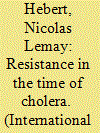

|
|
|
|
|
| Publication |
2014.
|
| Summary/Abstract |
The United Nations Stabilisation Mission in Haiti (MINUSTAH) is the latest of seven UN missions in the country, stretching over 20?years of international involvement. If the UN's Security Sector Reform (SSR) mission has had a 'stabilizing' influence on the country following Aristide's forced exile since 2004, a string of sexual scandals and the cholera scandal has progressively contributed to modify the local perception of the mission, seen as yet another foreign 'occupation' in Haiti. This article argues that while the resistance to the UN in Haiti is clearly contextual - linked to certain events and actions of certain individuals - it is also, and more fundamentally, structural in form. The article explores themes around the local resistance encountered by the UN in Haiti, using James Scott's multi-levelled approach of the landscape of resistance to highlight the complex nature of statebuilding in Haiti, while linking the more recent form of resistance to MINUSTAH to the specific securitization approach adopted by the mission and its restrictive mindset.
|
|
|
|
|
|
|
|
|
|
|
|
|
|
|
|